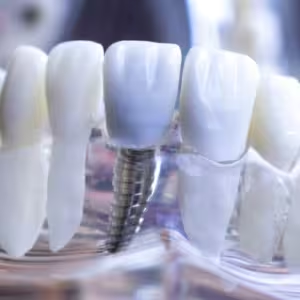
As we age, our dental health can significantly affect our overall well-being and quality of life. For many seniors, tooth loss is a common issue that can lead to various challenges, including difficulty eating, speaking, and even socializing. Fortunately, dental implants offer a reliable solution that can dramatically improve quality of life for seniors. At Dental 32 in Ashburn, VA, Dr. Ninh is dedicated to helping patients understand the profound benefits that dental implants can provide. In this blog, we will explore how dental implants can positively impact the lives of seniors.
Understanding Dental Implants
Dental implants are artificial tooth roots made from titanium that are surgically inserted into the jawbone. Once healed, these implants provide a stable foundation for replacement teeth, such as crowns, bridges, or dentures. Unlike traditional dentures, which can slip and cause discomfort, dental implants are securely anchored in place, allowing for enhanced functionality and comfort.
Improved Functionality
One of the most significant impacts of dental implants is the restoration of functionality. Many seniors who have lost teeth face challenges in performing everyday activities, such as chewing food or speaking clearly. These difficulties can lead to nutritional deficiencies and social withdrawal.
Enhanced Eating Experience
With dental implants, seniors can enjoy a wider variety of foods without fear of pain or discomfort. Implants function like natural teeth, allowing for efficient chewing. This can lead to better nutrition and overall health. Seniors often report feeling more confident eating out and socializing, knowing they can enjoy their meals without anxiety.
Clearer Speech
Tooth loss can affect speech clarity, leading to embarrassment and communication difficulties. Dental implants help restore proper alignment and function, allowing seniors to speak more clearly. This improvement in communication can significantly enhance social interactions and boost self-esteem.
Boosting Self-Confidence
The psychological effects of tooth loss can be profound. Many seniors experience a decrease in self-confidence due to changes in their appearance. Missing teeth can lead to feelings of embarrassment and social anxiety, causing individuals to withdraw from social situations.
Natural Appearance
Dental implants are designed to look and feel like natural teeth. The aesthetic benefits of implants can greatly enhance a senior’s appearance, restoring their smile and providing a more youthful look. This transformation can boost self-esteem and encourage seniors to engage more fully in social activities.
Reduced Anxiety
Knowing that their teeth are secure and functional alleviates anxiety for many seniors. Unlike traditional dentures, which can shift or become uncomfortable, dental implants provide peace of mind. This security allows seniors to participate in social gatherings and events without the worry of their dental appliances failing.
Long-Term Health Benefits
Dental implants not only improve immediate quality of life but also contribute to long-term oral and overall health. Here are some of the key long-term benefits:
Preservation of Jawbone Health
When teeth are lost, the jawbone can begin to deteriorate due to lack of stimulation. Dental implants help maintain bone density by providing the necessary support and stimulation to the jawbone, preventing the bone loss that often accompanies tooth loss. This preservation is crucial for maintaining facial structure and overall oral health.
Prevention of Additional Dental Issues
Replacing missing teeth with dental implants can help prevent further dental problems. Gaps in the mouth can lead to shifting of adjacent teeth, which may result in bite problems, uneven wear, and other complications. By restoring proper alignment with implants, seniors can avoid additional dental issues down the road.
Convenience and Care
Caring for dental implants is straightforward and convenient compared to traditional dentures. Seniors can maintain their implants with regular oral hygiene practices—brushing, flossing, and routine dental check-ups. Unlike dentures, which may require adhesive and specific cleaning protocols, implants require minimal adjustments and can be treated like natural teeth.
No Dietary Restrictions
Seniors with dental implants do not need to worry about dietary restrictions typically associated with dentures. They can enjoy hard and chewy foods that might be difficult for denture wearers, leading to a more enjoyable and varied diet.
Cost-Effectiveness in the Long Run
While the initial investment for dental implants may be higher than other tooth replacement options, they can be more cost-effective over time. The durability and longevity of implants—often lasting 10 years or more with proper care—mean that seniors may not need frequent replacements or adjustments, as they would with dentures. This long-term savings can make dental implants a wise choice for many.
Conclusion
The impact of dental implants on the quality of life for seniors cannot be overstated. From improved functionality and aesthetics to enhanced self-confidence and long-term health benefits, dental implants offer a transformative solution for those facing tooth loss. At Dental 32, Dr. Ninh is committed to providing personalized care and helping seniors explore their options for restoring their smiles and improving their overall quality of life.
If you or a loved one are considering dental implants, don’t hesitate to reach out to Dental 32. Schedule a consultation today, and let’s take the first step toward achieving a healthier, happier smile!
FAQs
Non-covered benefits may not be deemed medically necessary by insurance providers but can still be essential for maintaining dental health.
If a procedure isn’t covered by insurance, it’s essential to discuss alternative payment options with your dentist and budget for the expense accordingly.
Regular dental check-ups are critical for preventive care, regardless of insurance coverage. Skipping them can lead to more significant dental issues in the future
Budgeting for dental expenses ensures that you can cover the costs of non-covered benefits and access necessary treatments when needed.
